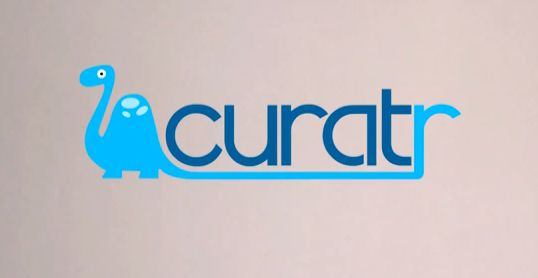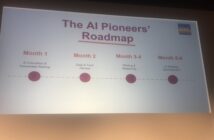He flunked school, got kicked out of college, set up a successful business and has just been awarded a PhD. Ben Betts has spent half his life in elearning and at 30 years old it is clear there is a lot more to come. LearnPatch caught up with Betts in the week he launched the latest version of his social learning platform Curatr as well as his latest project Learning Locker.
LearnPatch: How did you get into e-learning?
Ben Betts: When I was 14 I did some work experience at a software company and in the corner of a room was a computer with an Internet connection which took me on to AltaVista. No one really knew what to search for. It wasn’t that useful. But it sparked my interest and from that point I knew I was always going to be about the Internet. I started doing a lot of web design and started to help my dad with his work at Warwick University.
My web design work was focused on learning. I never had any formal instruction or design training – I just happened to work alongside people who did. It was less about techniques and more about the way you did stuff – and they knew a lot more than I did, which helped.
LP: Why did you stick with it?
BB: I liked the newness and the technology – they sparked the fire to begin with. The fact it was learning had very little to do with it to begin with. Every now and then, I get to see learning being a defining part of a person’s life. For example, if you create an online course you put it on your LinkedIn profile. You might share certificates or the fact you gained a masters degree. You get a feeling that this will be a defining moment in a person’s life. You don’t get many of them – you are born, you don’t have much choice in that, maybe you get married, you have kids… Jobs come and go and then there are qualifications. Learning is one of the big things.
I’m not suggesting that we have got it right in terms of the process but I do think there is something about learning being a defining part of our lives. And this is increasingly true if you think of the jobs people go on to get, the careers people go on to have and the work that people do now. It is all orientated around knowledge and the ability to keep learning – it does define the kind of career and life you can have. That’s the big deal for me.
The other thing is that I was shit at it. I made most of the bad mistakes to be made in education. I chose the wrong GCSEs, I chose the wrong A-levels, I chose the wrong university degree. I scraped through GCSEs because, frankly, they weren’t that difficult.
I had to quit biology after a year because I went from an N to a U. I did business studies at night school when I was 17. I started a cognitive science degree at Exeter and hated it. I switched to psychology. Hated it. I should have got a job instead of continuing with education. I then struggled onto my third degree, which was business management. In my third year I was so busy managing my e-learning business that they chucked me off the business management course. Unbeknown to the university, I had moved to London in my third year to run the company because it was doing well. I managed to swing it so that all my lectures fell on a Monday. For the first term I commuted from London to Exeter on a Monday morning to go to lectures and seminars and then returned in the evening to run my company for the rest of the week.
Then I missed an exam and I got found out. They found some byelaw that said you had to live within 30 miles of the university and told me I was making a mockery of the degree. I told them that I thought they were taking the piss – this was a business management degree and I was managing a business, what could be better? I didn’t graduate.
Years later I went back and did a masters degree instead. And I have just been awarded a doctorate. I’m probably one of the few people in the world that has an MBA and a doctorate but doesn’t have an undergraduate degree.
Learning is interesting because of these two parts. It can be defining and it has defined me in a lot of ways. But I was really bad at it – and that interests me.
LP: How did you get to a do a masters when you hadn’t done a degree?
BB: I’m quite good at selling things. I had a few things on my side: I did have sort of two thirds of a degree – transcripts of the first couple of years and I knew a lot of people who worked in learning and universities because that’s what I did.
I also had good references from university professors. I had just sold my company to HT2. If you sell a company for enough that turns people on to say, “Oh yeah, well he must know what he’s doing because he’s sold a business and he’s done this and done that.”
Experience, references and sheer bloody mindedness. It wasn’t easy.
LP: I had assumed you were quite academic.
BB: People tend to think I am academic and that I’ve got a long history in university stuff. It’s just not true.
LP: So, what does the intersection of business and learning look like from your perspective?
It splits between the check box exercise and the more aspirational side of things. I’m really not interested in the check box side of things. As a company we do check box stuff every now and again but it really isn’t the stuff that is particularly interesting. It represents the fundamental failure to understand what learning can give you and what it can do to improve things.
One of the things that is interesting is the sheer cost of recruiting people and retaining them and there is so much to be saved and so much to be done better by just getting people trained and learning and doing stuff.
I get frustrated when it’s a check box exercise because it’s got nothing to do with learning at all. Some people make the difference between training and learning. I’m not so convinced. I don’t like that. I try to have conversations in which learning is a fundamental part of how you do business. The key to our success is that people have the ability to take in new experiences and alter their behaviour. Learning is about a change of behaviour or thinking based on experiences. Some of those experiences will be those that just occur in the workplace and you will change because of them. Others are experiences we can take you on and maybe you will change because of them. There is a third more likely one – you will have experiences in the workplace, we highlight why those were important, why things can be done differently because of them and then you change. When you see people make connections that’s when you see change.
It’s about making those connections. That’s where I think learning is at and it’s a defining part of how good you are at running a company. How well you learn from experience.
How’s it changing? More and more people are starting to understand that. In terms of recognising that it’s happening, whether you like it or not. It’s changing in some other bizarre ways – it’s almost splitting. There are those people who are seeing the advantages of learning from experience and those who are seeing learning as a check box exercise.
It’s interesting when you see large organisations outsource their training. If you perceive learning and development in the organisation as a procurement function then you buy stuff. If you see it like that, then you would outsource it because that would be the best way to get economies of scale. It makes sense. But this approach is selling learning so far short of what it could be and should be in terms of being an integral part of what everybody does. It’s kind of scary.
You think we’ll change our business because of a course that somebody somewhere says is good and that’s definitely going to change things? Think about it. Nothing could be further from the truth. Going on a two-hour exercise – it’s not going to change anything. Some people are getting it and some people are really going the opposite way. It’s interesting times.
LP: When you talk to organisations about what you do and your approach to learning, what kind of response do you get?
BB: It depends on the audience. Generally people are initially sceptical . . . and still sceptical at the end but slightly enlightened. I did a session in London a while ago where I asked if everyone had heard of social learning and understood what it meant. Everyone said yes. I then took them on a journey about what I think social learning means. I’m not saying I’m right, but our interpretations couldn’t have been further apart. They took this blanket approach that it is fundamentally about using Facebook, Youtube and Linkedin.
That’s when you realise you are not even on the same page. In fact, I’m not convinced that it’s a profession in the UK. I don’t meet anyone who says I always wanted to be in L&D. They all fall into it with a variety of experience. They don’t feel it’s a profession. Some stay for a while and some come at it from different angles but there remains a fundamental misunderstanding about what learning is. Everyone thinks they understand it but no one actually does. I don’t understand it either.
LP: Surely there has to be someone in an organisation who has some expertise in learning rather than just being a procurement person or admin person. What you just said makes for depressing reading.
BB: There are pockets of inspiration and individuals who really get it. For every meeting I have where someone really doesn’t get it I have a meeting in which someone really does. The problem is you don’t know what you don’t know. You have to know a little before you realise what you don’t know.
LP: Labels such as social learning and gamification are doing the rounds. What’s your view on gamification?
BB: There are two things at play here. First there is a good idea and these ideas usually have basis in reason or logic. And then those ideas are torn apart. I don’t want to naysay on marketing but one of L&D’s biggest failures is its ability to market itself.
You have to be a bit careful because there is a real tension between the academic understanding of learning and the marketing of sexy things that neither one really gets. Marketing doesn’t care if it is research based. Research people think marketing is full of crap. People fail to see that there is a big role for both of them. I’m a big fan of gamificaiton and it is an increasingly important area of my research.
So, let me talk about some of our research. We have taken classes of people that have used our gamified social learning platform Curatr, and have analyzed the contributions that they made over time. In one class we had 33 students, all adults, all team leader or manager level and in full time jobs in service companies around the world.
Unbeknown to the students, we used Curatr as a part of their formal learning course at Warwick University to gather some data. The students had four modules and each module got progressively harder in terms of the gamification that we used, so in the beginning we have this system of levels and points and you make contributions in order to earn points to level up and in the beginning you need many, many points in order to level up and at the end you need a lot of points in order to level up. Gamification changes the experience from people just playing for the hell of playing to being forced to play.
We then carried out some content analysis on the contributions made and scored them on a scale of ‘cognitive presence’ which we used to show the critical level of thought people have reached in a discussion.
It’s a huge piece of work and one of the things that is interesting is the wastage. At best, 50% of people talking in social, just the social unstructured stuff, is rubbish and of no value. I’m not saying that it’s of no value in other ways but in the ways we measured it it’s of no value. If you force the comments, 75% of it is rubbish, and so the amount of rubbish depends on how you gamify it.
If you then dig a little bit deeper into that you find there is a real difference between how you structure the content. So if you just let people comment without any structural direction, then about 1% of comments make it to the top level of this tree of usefulness and if you structure it about 25% of it makes it to the top level. And when you have to make a comment, everybody did. They made about 4,000 comments, but none of the comments reached the top level of critical thought.
That’s the problem with gamification – it can be used in totally the wrong way. You will measure things and think you are being successful but you are just measuring the wrong things.
If we measure the wrong things there is a danger it will go out of fashion and I think gamification is heading for that.
LP: So how do you make gamification work?
BB: First, focus on structure so pre-structure the conversation so you have a trigger point – a video, a piece of content or a provocative question – that provides a trigger for people to comment.
Then you have got to get them to think about how it might map into the stuff that they already do, and then you ask them to think about how they might do things differently. This could be as simple as asking, “What are we going to do in that situation?”
Reward comments around this but think about reward for taking the ideas and conversation forward. That’s when you start to see the people building on others’ points or challenging them in some way.
It takes a degree of scaffolding to get into a critical conversation around a specific point. This is where L&D professionals can help. And then there is thinking about rewarding the right behavior, so that you can move people along. Gamify the smallest and the next smallest steps to get people to do what you need them to do.
Finally, there is a quite a lot of research about the benefit of short-term rewards and long-term processes. Quitting smoking, for example, is really difficult because it’s quite a long-term process that you have to stick to for a long time in order for it to work.
It is the same thing with getting a degree, getting a degree is a long term process and it can be very difficult to see what the next smallest step is when you are faced with this great big goal that is three years away. Gamification is a really simple sign post to say, “This is the next smallest step and I will tell you when you have got it and then we will move on to the next one.”
The ‘next step’ is what gamification is all about because you have got to give people short-term rewards wrapped in a long-term journey.




